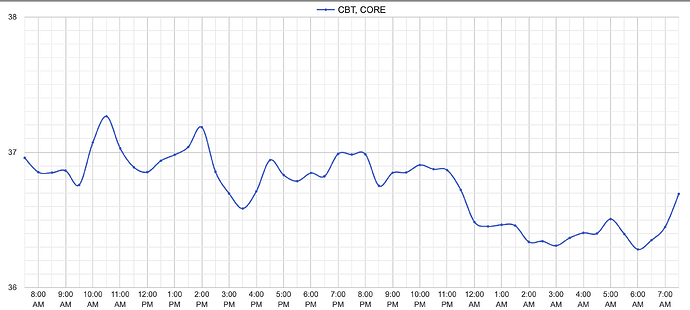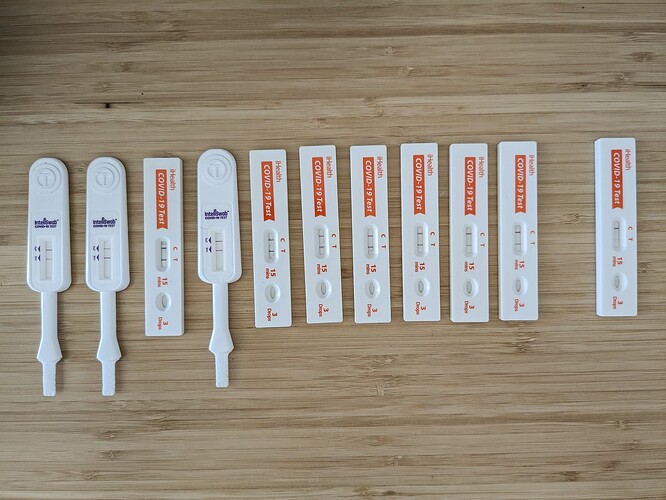CORE looks interesting. But reviews mention that there is no provision for exporting data. I also contacted them more than a week ago, and haven’t heard back…
Had to replace the battery again, after just 6 months; should have taken note of the original brand used!
Had a week or so of well-above-average temperatures, with bedroom temperatures not dropping below 25°C at night:
But this didn’t affect my morning body temperature readings, which averaged 36.8°C throughout:
That temperature shift ended up lasting only until August, and then there was no notable shift for a full year… So it’s probably not a seasonal thing.
Here’s the current plot of the weekly min/max/median of the daily morning readings, with periods of travel (all with a -9h time shift) in yellow:
After spending 2 weeks over the holidays in a warmer place (-4h time shift), it took several weeks for my body temperature to fully stabilize back at 36.7°C:
Weekly median readings including min and max range; period of travel highlighted in yellow.
Final update (for now), after a full 3 years of daily readings!
- No obvious seasonal pattern – but my body temperature does end up 0.1-0.2°C higher or lower when sleeping in a much (by at least 10°C) warmer or colder environment.
- Travel (with time zone changes of more than 3 hours) throws things off a bit, too: Could even use body temperature to track how well my circadian rhythm has adjusted!
- My body temperature readings appear to have been more stable over the past year than before. I’d like to think it’s because I have a more regular schedule, except I don’t think that’s really true. Perhaps I’m simply getting better at taking consistent readings?
- Couldn’t assess how much my body temperature increases during exercise, would need a different (i.e. not oral) device for that.
- Managed to not got sick, so didn’t get to test the “early warning” hypothesis

Ready to schedule your QS Show&Tell talk?
This is impressive dedication to data gathering - and even more impressive avoiding getting sick for three years.
I’d also be curious to compare your results with a CORE sensor. They now offer an online dashboard where you can export skin temperature + core temperature.
Not online?
No (it’s a very informal meetup).
FWIW I didn’t hold back any data or special insights just for the meetup ![]()
I just got one GreenTeg CORE device (Calera Research version).
It can export data with 1 sec resolution and it seems device able to capture circadian rhythm (especially circadian night) and exercise (overheating).
Here is an example of 24h data where circadian night can be clearly seen (11:30 PM to 7:00 AM) and siesta 3-4PM also can be seen
is there any correlation with the outside temperature? where do you live/ how are the temperatures throughout the year?
I had expected to see a seasonal pattern, but outside temperatures don’t appear to have an obvious effect, unless they affect the temperature of my sleeping environment by at least 10°C, as mentioned in this comment. This can happen when there is a heat wave (and no air conditioning), or if I am sleeping outdoors.
COVID finally caught up with me, unsuspecting, so I didn’t get any temperature readings leading up to it:
- The only advance warning I had (in hindsight) was a night of subjectively poor sleep (night to Wed). But I can’t say for sure if my sleep was impacted because I was about to get sick, or if I ended up getting sick because I didn’t sleep well.
- Garmin’s overnight HRV values appear to be more sensitive than the resting HR values, but neither provided any advance warning.
Interesting. Looks like a mild infection. I am glad for you.
Interesting, how tenaciously this virus holds onto its feeding ground. I don’t know though how long an ordinary rhinovirus usually persists.
I wonder if the CORE temperature could be synced back to Apple Health. Does anyone have this information?
Also, does anyone know if the data from CORE could be easily used in some other app to track menstrual cycles? I am trying to find some convenient alternative for my wife. She is not keen on watches, so I thought about the OURA ring, but the CORE sensor would be cheaper and probably more precise for this purpose.
Since i’m not using iOS / Apple Health i can’t comment on this. As far as i know its not supported at the moment. But you may better mail their support Contact



